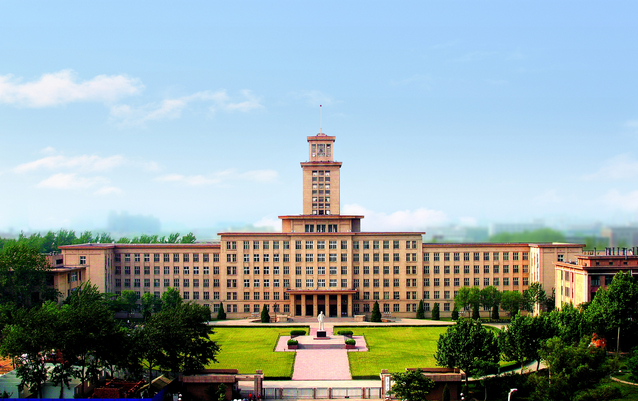Nankai University’s “New Liberal Arts” Construction of Urban Management Makes Headway

Guangming Online (Academics) reviewed and commented on the domestic research progress of Urban Management, and found that Nankai University ranks second in China. In recent years, Nankai University’s Zhou Enlai’s School of Government has been taking the demand of national developing strategies and disciplinary transformation of public management as its mission, making an effort to boost the “New Liberal Arts” construction of Urban Management to a new heights.
Since 2005, Zhou Enlai’s School of Government has started to study the issue of urbanization systematically and launched the undergraduate program of Urban Management in 2013. In 2016 and 2019, master’s and Ph. D. programs of Urban Management and Development were established respectively. Since the launching of the undergraduate program, the program has cooperated with the University of Glasgow, which ranks first in Urbanology in the UK, adopting “3+1” cooperative mode for undergraduates and “3+1+1” mode for the undergraduate-master program. In 2018, Nankai University-University of Glasgow Joint Graduate School initiated a collaborative Ph.D. program in Urbanology so that the discipline of Urban Management could create a high-level and complete undergraduate-master-doctoral talent cultivation link at home and abroad. These years, 94.8% graduates of Urban Management at Nankai have furthered their study at Cambridge University, University College London, London School of Economics, University of Edinburgh, University of Sheffield, University of Chicago, Cornell University, Columbia University, University of Texas, Tsinghua University, Peking University, Renmin University of China, University of Hong Kong, Hong Kong Chinese University, Shanghai Jiaotong University, Fudan University, Nanjing University, Nankai University, etc. The quality of Nankai’s education has been highly praised from all sides.
In talent cultivation, Nankai’s Urban Management values both learning and practice. With a complete development pattern with Chinese characteristics, S&T support, international horizons, research-based and practice-oriented education, the discipline focuses on issues like urban transformation, housing policy, smart cities and neighborhood life circles, adjustment of urban governance structure, and urban grassroots governance. The department makes efforts to break down the barriers among majors, promoting the in-depth multidisciplinary integration of liberal arts, science and engineering, and deepening the integration of the domestic curriculum system with that of well-known foreign universities. The department has built the first batch of “computational social science laboratories” in domestic universities, and has prepared the urban professional service database, typical urban geographic information database, urban governance case database and housing big data information database. These efforts provide potential approaches for the university’s strategy of “Liberal Arts Revitalization”.
After years of effort and construction, the discipline of Urban Management has gathered a number of high-level experts and scholars, and the talent training program has been gradually improved. In many domestic discipline professional rankings, Nankai University's urban management major ranks among the top three in China. The organizational idea of the discipline adheres to youthful, international, and multidisciplinary characteristics. The academic background of the teaching staff covers administration, political science, sociology, urban planning, geographic information, public policy, etc., and leads the academic trend in domestic academic research. The team includes many famous scholars in China, including a member of the academic degree evaluation group of the State Council, vice president of the Chinese Society of Political Science, vice chairman of the Political Science Teaching Steering Committee of the Ministry of Education, vice chairman of the China Institute of Institutional Management, a member of the University Public Management Teaching Steering Committee of the Ministry of Education, a member of the China Committee of the International Academy of Administrative Sciences, vice chairman of the Public Management Special Committee of the China Institute of Management Modernization, President of Tianjin Society of Political Studies, and President of Tianjin Society of Administrative Management.
In recent years, the team has published more than 200 high-quality papers in Public Administration Review,Journal of Urban Affairs,Accident Analysis and Prevention,Urban Affair Review, Journal of Cleaner Production,International Journal of Environmental Research and Public Health, Sustainability, Social Sciences of China, Management World, Cass Journal of Political Science, Chinese Public Administration, Journal of Public Management and other famous academic journals both at home and abroad. A number of results have been approved and adopted by the central government, national ministries and municipal governments, and their total scientific research funds have reached more than 20 million yuan. In particular, during the outbreak of the COVID-19, the team has carried out questionnaires, surveys, and in-depth investigations throughout the country, provided various kinds of consultative reports and published more than 30 articles to the central and provincial governments, many of which were approved by senior leaders or published in People’s Daily, Guangming Daily, etc.
Faced with the trend of global city development, Nankai’s Urban Management will focus on China’s rapid urbanization, construct a talent cultivation system with wide horizons, a solid foundation and of strong quality. Disciplines like information technology, big data and engineering will help in promoting the plan of “Liberal Arts Revitalization”, promoting Urban Management to become an important pivot for “New Liberal Arts” and constructing a disciplinary system with a combination of liberal arts, science and engineering, achieving the multidisciplinary integration of resources. Based on the requirements of national and regional development strategies, the university will build a high-level decision-making think tank for the needs of national and local governments, further expand the influence of Nankai University at the national and regional levels, and provide a solid theoretical guarantee for the sustainable development of “Urban China” and an excellent talent supply in line with China’s practice.
(Reported by Xiaoqin Tan, Translated by Yuchen Shi, Edited by Daniel Stefan and JianjingYun)









